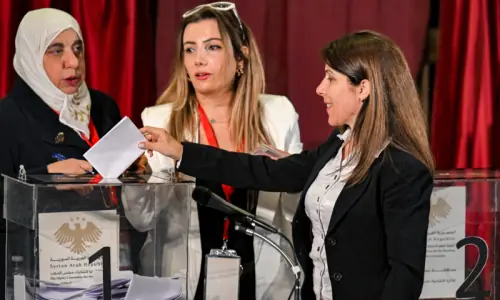Damascus:
The results of a weekend ballot for members of Syria’s transitional parliament, the first assembly to form since the ouster of longtime ruler Bashar al-Assad, showed significant underrepresentation of women and minorities, prompting immediate criticism of the process.
The electoral commission announced Monday that of the 119 members selected by thousands of local committee members on Sunday, only four percent were women. This figure stands in stark contrast to the 14 percent of candidates who were women.
Electoral commission spokesperson Nawar Najmeh noted the low number “is not proportionate to the status of women in Syrian society and their role in political, economic and social life.”
The selection process itself was highly criticized as undemocratic. Local committees, appointed by the electoral commission (which was itself appointed by Interim President Ahmed al-Sharaa), selected two-thirds of the assembly. President Sharaa is set to appoint the remaining 70 representatives to the 210-member body.
Minorities and Excluded Territories
Najmeh also reported that only two Christians were among the winners, calling the representation “weak considering the proportion of Christians in Syria.” He suggested that the seats appointed by the president “could compensate” for some underrepresented components but firmly rejected any quota system. Notably, Syrian-American Henry Hamra, the first Jewish candidate since the 1940s, was not selected.
Seats in the Kurdish-held northeast and the Druze-majority Sweida province in southern Syria—territories outside Damascus’s immediate control—were excluded from the process.
The commission acknowledged the delay in balloting for these regions, stating they are “serious about having supplementary ballots” but were unable to set a timetable due to the stalled implementation of a March 10 agreement between Syria’s Kurds and Damascus regarding integration.
Political activist Nour al-Jandali, who was selected for a seat, emphasized the responsibility of the new lawmakers. She noted the challenge of “how we re-establish a state built on freedom, citizenship and justice,” and stressed that “women must have a real and active role” in drafting public policy.
Under a temporary constitution, the incoming parliament will exercise legislative functions until a permanent constitution is adopted and new elections are held.



